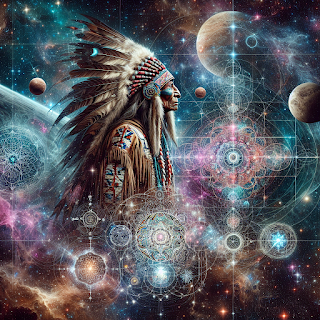Beyond Time and Space: Exploring Non-Linear Existence
When I first began to reflect on the true nature of time and events, I found myself venturing
into a realm of thought that was as challenging as it was liberating.
The realization that 'time' is a construct of our minds is not just a groundbreaking concept
—rather, it is a profound shift that challenges everything we thought we knew about reality
and ourselves, our lives, our development. It shakes the very language we use, how we think,
and our expectations in every sphere of our existence.
In this article, I aim to explore this revolutionary understanding that upends conventional
spiritual beliefs and redefines many long-held New Age and religious ideas.
Beyond Time and Space
Throughout human history, we’ve held the belief that time moves in one direction
and that space is fixed and unchanging. But as we deepen our understanding of how
consciousness works, a new concept emerges: non-linear existence.
This transformative idea fundamentally changes how we understand our lives and
our place in the world. We are moving into an era where the traditional limits of time
and space no longer apply, reshaping what it means to be human in a non-physical experience.
What Is Non-Linear Existence?
Non-linear existence challenges the conventional view that time moves forward
in a straight line and that space is a static framework.
Instead, it suggests that the past, present, and future all exist at once, and that our minds can interact with this broader reality. This is not just a
theory—it's a new way of understanding how life works and how we can
influence our own experiences.
In this new paradigm, the events of yesterday do not have to dictate who
you are today or who you will become tomorrow. Every moment offers
the potential for change, and every possibility is within reach. This understanding opens the door to new ways of thinking
about our choices and our potential.
Practical Applications of Non-Linear Thinking
Understanding non-linear existence isn’t just an interesting idea—it’s a
practical tool for making real changes in your life. Here are some ways
you can apply this new understanding:
Overcoming Limiting Beliefs: The beliefs that have been holding you back are not permanent. They are patterns you can change. By focusing on the version of yourself that isn’t limited by these old beliefs, you can start living with more freedom and possibility.
Rethinking Karma: Traditional ideas about karma suggest that your past actions determine your future in a strict, unchangeable way. But if all moments exist at once, this view is outdated. You’re not bound by past mistakes. You can change your actions and your mindset now to create the future you want.
Manifesting Desires: Instead of seeing your goals as distant or difficult to achieve, understand that the future you want already exists as a possibility. By aligning your actions and thoughts with that reality, you can bring it into your present experience.
Moving Beyond Time-Based Belief Systems
This understanding has profound implications for science, particularly in fields that rely heavily on linear time, such as evolutionary biology. Evolution, as traditionally understood, is a process that unfolds over millions of years, with species gradually adapting and changing in response to environmental pressures. But what if time is not a linear progression? What if the future can influence the past just as much as the past shapes the future?
As we embrace the concept of non-linear time, science may need to rethink
foundational concepts like evolution. The idea that all moments exist simultaneously
suggests that evolutionary changes might not be a simple cause-and-effect process
stretched over eons. Instead, evolution could be seen as a dynamic, interconnected
process where all possibilities exist at once, and what we perceive as "progress"
could be a result of interactions across time, rather than a straightforward, linear development.
This doesn't mean that traditional scientific theories like evolution have no
value—they can still offer insights and serve as tools for understanding. But they
should be seen for what they are: stepping stones that have helped us navigate a
more limited understanding of time and existence.
As we embrace a non-linear perspective, it’s time to let go of the idea that our lives,
our identities, and even the development of life itself are bound by the constraints of
linear time. We are far more than the sum of these influences. Our true power lies in
our ability to consciously create and interact with reality, free from the constraints of
time-bound thinking.
In conclusion, it’s time to move beyond these time-based belief systems and scientific
paradigms and step into a new era of personal and collective understanding, where we
are the creators of our reality, unbound by the limitations of the past. This exploration
into the true nature of time and events is not only a personal journey but a collective one,
defining what it means to be human in this ever-evolving universe.
.png)
.png)
.png)
.png)
.png)
.png)
.png)
Comments
Post a Comment